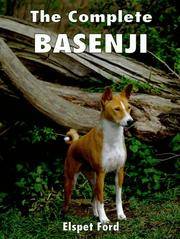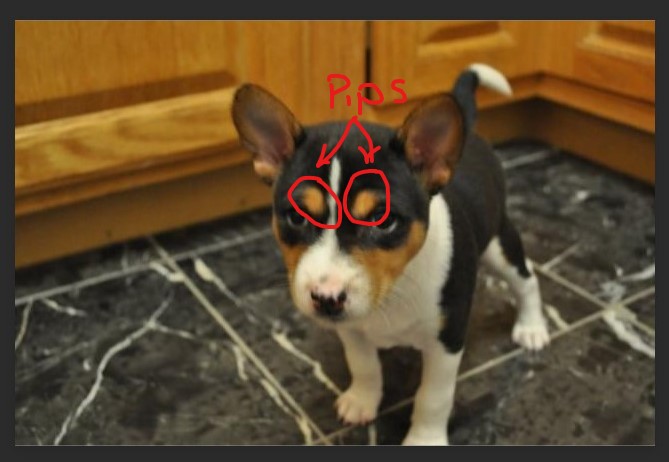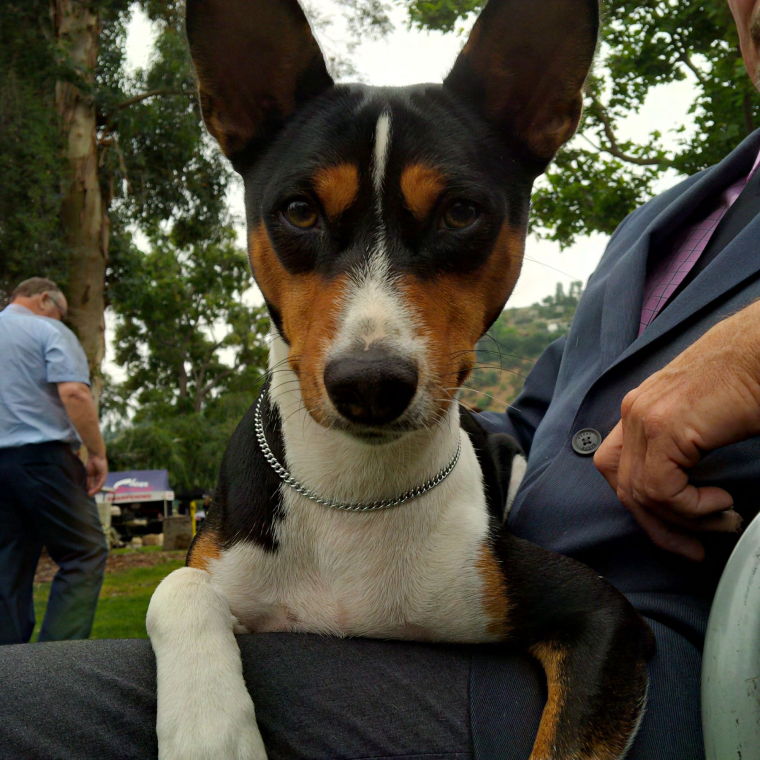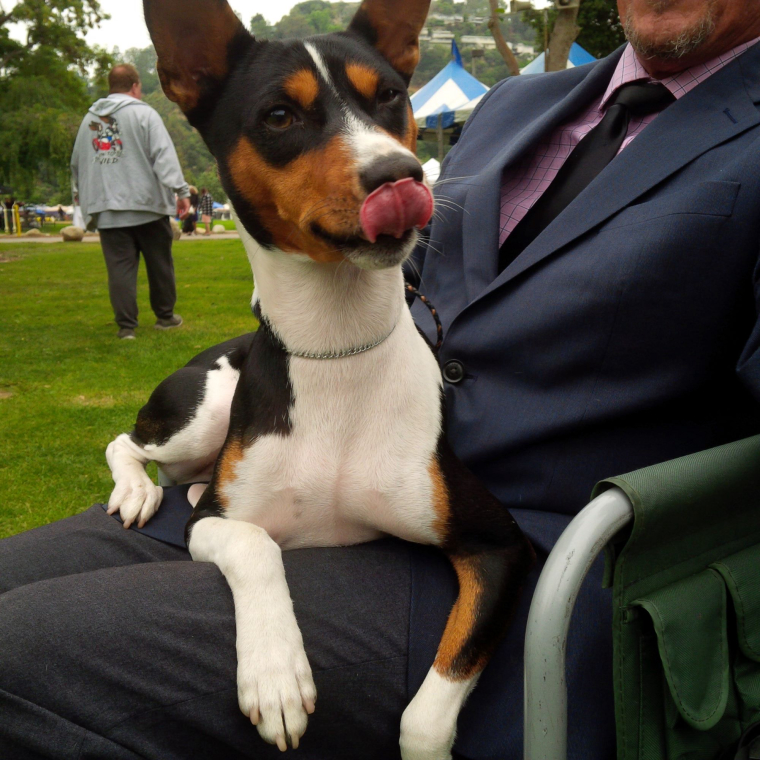Looks can be so deceiving- here is an article of a woman who adopted a rescue dog in N.J. Dog looks like a basenji - even her vet thought it might be basenji. She did an Embark DNA test - no basenji. Turned out the dog was a mixture of Mountain Cur, Rat Terrier, Beagle, and Boston Terrier. link text
A Basenji, a Volcano & a Clown Car
-
A few observations about Logan's temperament... I've noticed Logan is very well mannered. He seems to always look for permission. He won't enter the house until I do so first. He always looks to me before entering a room as if to ask "Is it ok?" Maybe from being with his Momma for two years?
I find him really easy to walk too. Easy to correct the direction we're going without a big fuss on his part. And, he's figured out where the house is that he's staying. He can lead us right there. Smart little guy. And, he's a talker. While I haven't heard a baroo yet he definitely let's us know that he's all in for a meal or a walk.

-
@donc - I disagree DonC, there are many many responsible breeders, however that said people need to "vet" breeders as they do in buying a car or a home. Difference is this is a living breathing animal that will be in your family for 15+ years. Responsible breeders breed to improve the breed... and health/temperament are at the top of that list. Reason that responsible breeders "interview" potential homes and learn about their lifestyle. And we differ in opinions about a show setting, if a dog has a poor temperament it will show immediately in the show ring or in a performance event like lure coursing. And it is MOST certainly about temperament for a show champion. Many of these Basenjis are then used for breeding, however responsible breeders DO NOT BREED FOR THE MONEY... in raising a litter it is very rarely that you can make a profit, we are lucky to break even. It is the "for profit" people that only care about the money. They do not health test or very limited if at all, they do not raise their litters in the home... they do not socialize pups, they do not take responsibility for the pups they breed. Most all responsible breeders place the pup that fits the home/family, they have contracts that state that the pup is to be returned to the breeder regardless of the reason for its life. Granted there are far too many non-responsible breeders that have websites, sell on line, ship to whoever and where ever.... And for sure, Astarte is one of the best responsible breeders. Our last litter was sire by a dog that she bred, Astarte's Sir Tristan With Pips At Kazor that Carol Webb has (Kazor) who is a Grand Champion and a dog with a wonderful temperament... we had lovely pups and placed in wonderful pet homes and in show homes. And two of these girls will make their debut at the shows in Reno the end of the month... should be fun to watch!
-
Wishing you good luck in Reno with your girls. I won't be going but Jay Webb will be there with another Tristan puppy. I already feel like a winner. And I agree with all your comments on temperament....at the top of the list for sure. We have come a long way to not continue.
-
@jengosmonkey I teach all my dogs not to rush gates or doors. Very important for any dog. Too many die from being hit by cars.
-
-
@astarte I did a quick check to make sure there was a picture of Tristan in the database - there is but I'm sure there is a more up-to-date one lying around someone could send me ?
'Tis but the work of a few seconds to update a photo, once the program is aware one exists.
-
I have several I can send you of him stacked. Should I send it to your email address?
-
@astarte
OH MY! Tristan is so sweet! What a HANDSOME young man!

-
@astarte yes please !
-
@Zande I spent some time yesterday exploring your pedigrees at www.pedigrees.zandebasenjis.com. That was really interesting to be able to do that. We knew nothing about Jengo's lineage or past when we got him. WE had no idea at all how he spent any of his time prior to us taking him. We were always curious if someone loved him and he escaped? Was he abandoned? Was he passed from place to place? Who bred him and how did he grow up?
Flip to Logan and we get to know everything. We now know his lineage going back generations. My son thought that was amazing, that people keep track of that. His comment was "That's a lot of dogs!" I know where and how he was raised. Who he was raised by and with. In his case he comes from a wonderful home with lots of playmates.
It's also kinda neat that the pedigrees let me see the different kennels that are cooperating with one another to improve their lines. I could see relationships that easily stretch back a several decades. The pictures just bring everything to life too. I still don't know what some of the red TLAs (Three Letter Acronyms) are in some of the titles, but I'm assuming they must reference achievement awards like Champion, etc?
-
@jengosmonkey - Mostly the acronyms are either titles and from foreign breedings/showing.
-
@zande Done - it's his movement that is extremely impressive - he floats thru the air.
-
@jengosmonkey
Here's a link to help decode some of those TLA's, AKC Titles Sorted Alphabetically:
https://www.akc.org/sports/titles-and-abbreviations/akc-titles-sorted-alphabetically/ -
@helle-devi THAT is really helpful! Thanks for that. I was only familiar with a few of those TLAs. When I was a kid my Mom and Dad were Sheltie (Shetland Sheepdog) breeders. I went to shows and training with them, but was much more interested in just playing with them and the pups. Mom focused on confirmation and Dad focused on obedience. The kennel name was Appin, which was the name of a coastal district in Scotland. Anyway, we had this one dog that we all adored. Her name was Bonnie. She was mostly Dad's dog so she was obedience trained, She had CD, CDL, and UD awards.
So the other TLAs that aren't on the AKC list like CRd, PRA -N, PRA- Cr, CLd seem to be disease testing related?
-
This is something else I found really fascinating. sometime back, my wife picked up a book from the library that had been withdrawn from their collection: Ford, Elspet – The Complete Basenji / Elspet Ford ISBN 0-87605-016-X

Chapter 10: Breeding Basenjis had a pretty neat paragraph about color combinations. Hopefully Ms. Ford is ok with me sharing the snippet since I’ve given her credit…
(EDIT) I've since learned that Elspet was English and the sweetest lady you'd ever meet. Another passionate fan and champion of the breed. A generous friend and an easy to travel with partner.
“When Breeding for Colour:
RED TO RED will produce an all red litter, unless both animals carry the recessive tricolour gene, in which case one or more tricolour puppies may result. A tricolour in a litter from a red to red mating may come as a complete surprise to a breeder, especially if, on examination of the pedigrees, the only tricolour ancestors are seven or eight generations back.
RED TO TRICOLOUR will result in all reds unless the red parent carries the tri gene as above. A percentage of the resulting red puppies will carry the tri gene.
BLACK TO RED will give reds, blacks, and again, tricolours may appear if the recessive gene is carried by both parents. Black is a dominant colour and must be present in one parent to ensure black progeny. It is also possible that this mating could result in no black offspring.
BLACK TO TRICLOUR will probably result in all three colours again, depending on the genee carried by the black parent.
BLACK TO BLACK – it is possible that this will again result in all three colours, depending on the color of the parents’ ancestors.
TRICLOLOUR TO TRICOLOUR – the puppies are always tricolour. Recessive blacks can turn up in any litter where both parents carry that particular gene.
BRINDLE is a dominant colour and must be present in one parent, but again, it is possible that a brindle will not be produced in the resulting litter. As the Brindle colour is only present in the United States at the moment, the full potential for the colour has still to be investigated and assessed.”
Again, just fascinating. It made me think of two things right away: how important it is to have a picture in the pedigree, and Stella's (Astarte) use of "With Pips" in her names. I'm guessing that anytime I see "With Pips" in a name, I know that dog is a Tri?
The other thing I didn't know was that Brindles are specific to the the US? I thought for sure I'd seen pictures of Brindles in Africa. I'll have to do some hunting.
-
@jengosmonkey said in A Basenji, a Volcano & a Clown Car:
anytime I see "With Pips" in a name, I know that dog is a Tri?
Good question! Exactly what does "with Pips" mean?
-
@elbrant Pips are the brown eyebrow spots just above the eyes on a tri. At least I think they're only found on a tri.

-
@jengosmonkey
"So the other TLAs that aren't on the AKC list like CRd, PRA -N, PRA- Cr, CLd seem to be disease testing related?"
Yes. CRd means "Carrier" vs. CLd is "Cleared" - usually relating to Fanconi in Basenji, but applies to other genetic diseases. (e.g., breeding a CRd with a CRd just about guarantees an afflicted litter)
PRA - N = "Normal" for that PRA test.
There's a whole TLAs list, though much shorter, for the OFA tests. -
@jengosmonkey
Isn't fascinating?!! It's almost like playing roulette!
There's a FB discussion group of Basenji breeders who really get into the actual gene-sequencing of colors if you have the time and interest to explore further.
Waaaay into the weeds, and plenty of TLAs to spare! Here's a sample: " There are Concentration and Intensity genetics that are thought to interact phaeomelanin. And as for E - there are 3 locus that are known and can be tested for E, e2 (cream in Australian Cattle dog) and e3 (cream in Siberian Huskies)"
Here's a sample: " There are Concentration and Intensity genetics that are thought to interact phaeomelanin. And as for E - there are 3 locus that are known and can be tested for E, e2 (cream in Australian Cattle dog) and e3 (cream in Siberian Huskies)" -
@helle-devi The genetics part of it is tough. And, it seems the more we've learned, the more complicated it seems to have gotten. I told Stella about remembering my Mom; her friends Joan and Bobbie; and their geneticist friend Bob, from UC Davis all pouring through pedigrees. This was way before computers, so it was all paper. Bob had them looking for and highlighting any dogs that had collie eye, which was the problem in Shelties they were trying to solve back then. They were looking for links to individuals and lines. Quite mind numbing. Mom said they learned it showed mostly in Blue Merles, which of course was the color I wanted the most. She refused to breed them. So of course... when I got my bachelor dog, an Aussie/Border Colie mix... he was a Blue Merle. I promptly flew he and I to Colorado so I could show him off to Mom. Show her that I finally had a Blue. :face_with_stuck-out_tongue_closed_eyes: She told me on the spot that Sheltie Blues were fine now and the next two she got were both Blues. Infuriating! :smiling_face_with_open_mouth_smiling_eyes:
Seems to me that it makes sense to team up with other breeders. How can anyone know everything?

